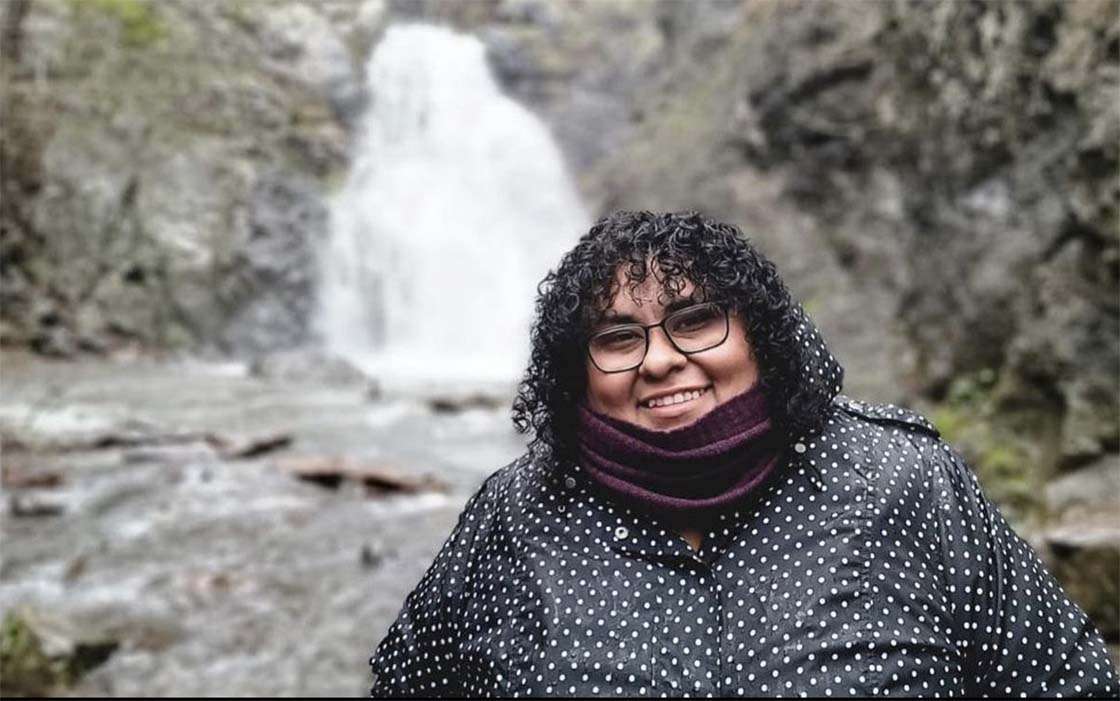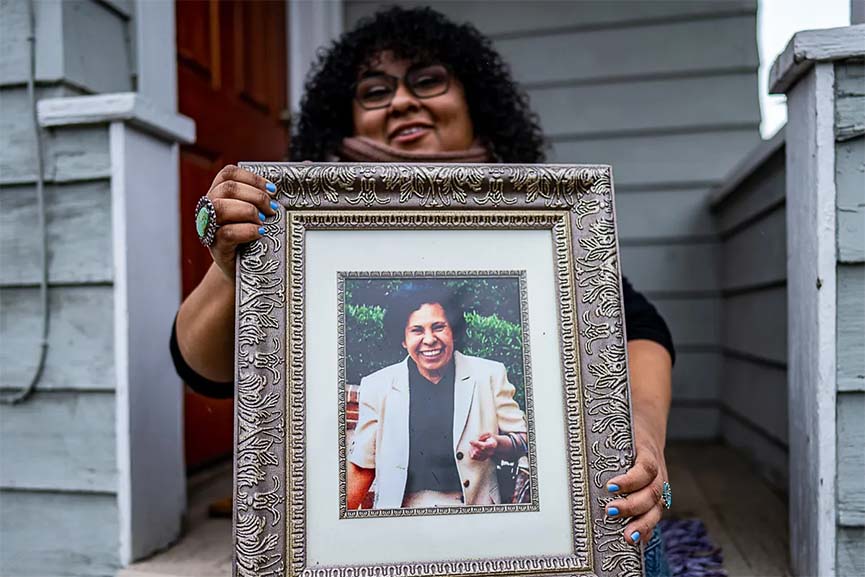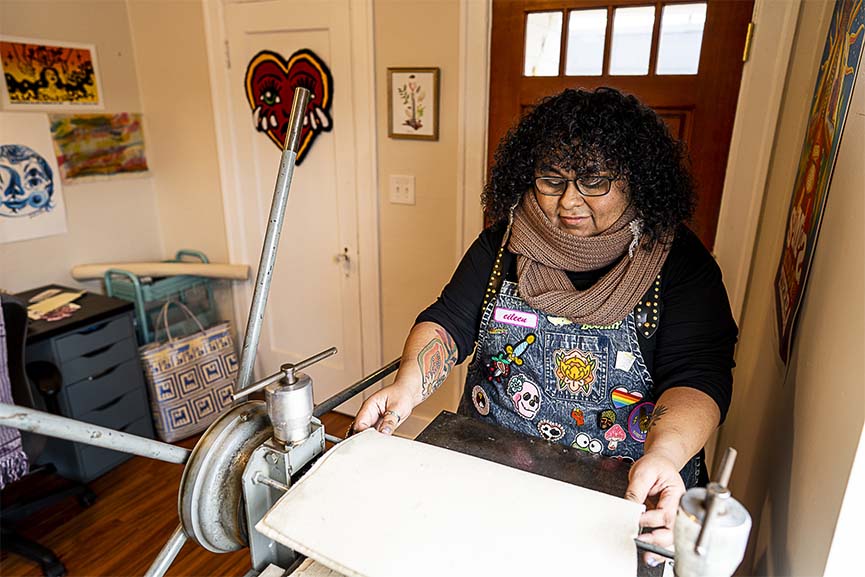
Eileen Jimenez: Persona Educada
This Section's arrow_downward Theme Info Is:
- Background Image: ""
- Theme: "light-theme"
- Header Style: "purple_dominant"
- Card Height Setting: "consistent_row_height"
- Section Parallax: "0"
- Section Parallax Height: ""
Di beña i mä nänä. Mana pa ga nuhu. Na pa gañandihu. Di mödi i.
These words open Eileen Jimenez’s doctoral dissertation. They’re written in Otomi, a language spoken by the Ñätho, an Indigenous people from Central Mexico. The message is a dedication to Jimenez’s mother Maria Cruz.
Maria left Mexico to pursue the dream of a better life for her family in the U.S. “She didn’t speak English but she knew all the words to La Marseillaise in French and loved reading about Beethoven,” said Jimenez, when reflecting how her mother is the most brilliant woman she knows.
The family settled in Anaheim, Calif. “We were a freeway exit away from Disneyland,” said Jimenez. “I used to go outside every night at nine o’clock to watch the fireworks from Disneyland.”
Maria often worked multiple jobs to support the family of seven. “She made $18,000 a year,” said Jimenez. “She had such a hard life but she was always so happy.”
Jimenez’s mother passed away 10 years ago. “It actually feels really hard to navigate this without her,” said Jimenez of completing her doctoral degree in educational leadership. “When I graduated with my bachelor’s there were three ceremonial events I was eligible for and we went to all of them.”
Maria’s spirit lives on — in her daughter. Eileen Jimenez comes from a long line of strong, smart women. “My great-grandmother Isidora Saavedra taught the women in her family to lead with love, care and kindness. My grandmother Eloisa Saavedra organized protests in Mexico and my mom was a leader in her community,” said Jimenez.

Jimenez is the first in her family to be born in the U.S. This carried with it certain responsibilities and expectations. Navigating life in a mixed-immigration-status family was painful and complicated, and informs her leadership and commitment to liberation today.
Jimenez excelled in the classroom. “I knew I had to go to college,” she said. “It was important to my family.” Jimenez applied and was accepted to the University of California, Los Angeles (UCLA).
A first-generation college student, Jimenez struggled early on to find her footing. “I came from a community where not a lot of people went to college,” she said. Still, Jimenez pressed ahead and turned her facility with numbers into a math major. “I remember a lecture in my first upper division math class about proving that numbers don’t exit,” she said. “That broke my brain.”
The then-twenty-year-old was also taking French classes at the time and decided to switch majors. “My bachelor’s degree is actually in French and francophone literature and culture,” she said. “My time at UCLA taught me that I was smart and could navigate systems so I like to say that I got my degree in resiliency.”
Jimenez went on to earn a master’s in counseling and student development in higher education from California State University, Long Beach. Along the way she decided to pursue a career in academia. Jimenez worked for the Upward Bound program at CSU Fullerton and later took a student services position at the UC Irvine. “Your work life is your life at California colleges,” she said. “I was working sixty hours a week and wanted something different.”
In 2017 Jimenez accepted a position with the TRiO program at Highline College in Des Moines, Wash. She stayed with TRiO for almost five years and spent half of that time as the director of student support and retention services.
Jimenez had a bachelor’s and a master’s degree but she had always known there would be another step. “I’ve wanted a doctorate even before I really knew what that meant. It’s something that my mom and my family talked about,” she said. In her family they talked about life’s purpose is being a persona educada, a person who is kind, who values stories and knowledge and who serves their community, with or without a formal education.
There are a lot of doctoral program both in the U.S. and around the world. In the U.S., these programs can come with a history that has not always been welcoming. “Everyone was telling me how traumatic getting a doctoral degree would be and how traumatic doctoral studies are for people of color, especially Indigenous people,” said Jimenez. “So, I was really wary about picking a program.”
Jimenez did some research and learned about the Muckleshoot Cohort in the Educational Leadership program at UW Tacoma. “This program just seemed really different,” she said. Jimenez applied and was accepted into the inaugural cohort.
The past three years have been challenging and rewarding. Jimenez became the first member of the cohort to have their dissertation approved, which means she is now Dr. Eileen Jimenez. “This experience has been more meaningful than I ever imagined school could be,” she said. “It was really beautiful to learn with and from Indigenous scholars.” The program also created space for wholeness through art. Jimenez created and included her own artwork in every single assignment.

Learning is a part of any degree program and sometimes this extends to outside the classroom. “I learned a lot about myself and my place in the world,” said Jimenez. “I started relearning my family’s language, which wouldn’t have happened if I wasn’t in this program.”
To do this Jimenez talked to her family but she also started following Instagram accounts that share how to learn Otomi. She also reads poetry written in the language. “It feels really good to think about, that in this generation, our language is being spoken out loud again,” said Jimenez.
Spoken and written.
Di beña i mä nänä. Mana pa ga nuhu. Na pa gañandihu. Di mödi i.
Recent news
Main Content
Gathering Strength
News Tags on this arrow_upward Story:
- None
Main Content
UW Tacoma Enrollment up 4% for Autumn 2024
News Tags on this arrow_upward Story:
- None
Main Content
Celebrating First Gen
News Tags on this arrow_upward Story:
- None



